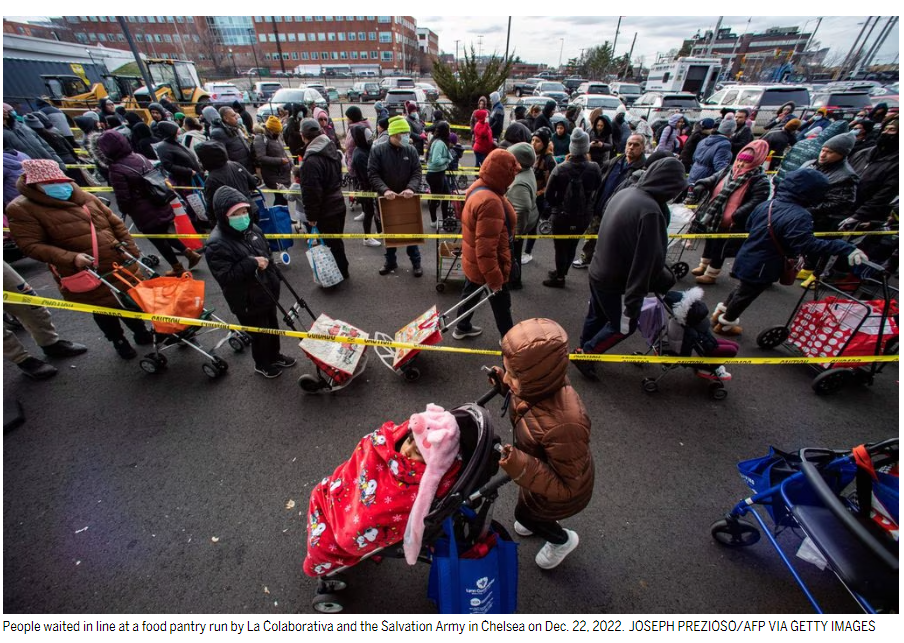How Massachusetts Can Defeat Hunger

Hunger is pervasive throughout Massachusetts. Many of the 1.8 million food insecure adults must consider daily trade-offs: Rent or groceries? Pay the utility bill or buy food to feed their family?
The Greater Boston Food Bank’s 2023 study, conducted in collaboration with Mass General Brigham, centers on historically unheard voices and estimates that 1 in 3 Massachusetts adults are food insecure; an astonishing 36 percent of surveyed households with children reported their child is food insecure — meaning the child was hungry, skipped a meal, or did not eat for a whole day because there wasn’t enough money for food.
It’s a staggering statistic, one at odds with Massachusetts’ overall wealth, robust level of charitable engagement, and policies that support families. However, food insecurity isn’t always obvious. It manifests quietly in hundreds of local food pantries, or in children going hungry or eating the cheapest and least nutritious foods, or in coping mechanisms that hardly anyone sees, like parents watering down baby formula or pawning or selling personal property to have money for groceries.
Although already severe, food insecurity in Massachusetts will probably get worse this year with the cutbacks and sunsets in federal benefits, such as the unwinding of Medicaid coverage and the resumption of federal student loan repayments. Moreover, hunger is intertwined with our high cost of living as historically high inflationary pressures hit everyone. A 2023 report by the Government Accountability Office found US food prices rose 11 percent from 2021 to 2022, the highest annual increase in 40 years.
The good news is hunger in Massachusetts can be defeated. The state is small enough to collaborate and share resources. We have the best minds — in business, academics, health care, the nonprofit community, in local and state government, and in the infrastructure to address this debilitating fact. There have already been commitments and convenings by industries to support the national strategy on hunger nutrition and health.
The Healey administration understands the consequences of not addressing this issue and the urgency of tackling it with unity and coordination. Lieutenant Governor Kim Driscoll, who served 17 years as mayor of Salem, has the hands-on experience of advancing food security at the municipal level through her convening of the “Salem Food for All” food policy council, an effort in concert with the national coalition Mayors Alliance to End Childhood Hunger.
We will need everyone from these industries at the table, working together to end hunger here.
Massachusetts must recognize we’re in a new era, one of overlapping emergencies. Food insecurity is too big to be conquered with our current approach, and we need a renewed focus. The challenge is to rethink our playbook and, most important, elevate food insecurity as a statewide policy priority. Our new report outlines many recommendations, but a first step would be to create a state Office of Food Security to give the issue the prominence it deserves. This office would coordinate existing and new resources to address food insecurity in Massachusetts by aligning federal funding with state agency coordination. Currently the state Department of Transitional Assistance administers SNAP assistance, the Department of Public Health administers WIC, the Department of Elementary and Secondary Education oversees school and summer meals, and the USDA administers food for the food bank system — with MassHealth piloting the Flex Services program. The office should also expand access to the joint online portal and streamline applications for critical programs and elder feeding programs. Lastly, it could, through the Massachusetts Department of Agricultural Resources, engage our agriculture industry, leverage our statewide charitable food system embedded in every community, and interact with these programs in a variety of ways.
Such an office, a model for which has been proposed in legislation filed by Representatives Ann-Margaret Ferrante and Hannah Kane, would provide a big-picture look at hunger and the available resources. Dedicated state oversight would streamline efforts to make food benefits easier to access and help integrate health care into the charitable food system, particularly through the state-funded Massachusetts Emergency Food Assistance Program. It would also support the state’s own domestic agricultural system, which has great potential to keep the whole of Massachusetts more food secure and would consider how policies like universal school meals would need to be made permanent.
Food insecurity must emerge as an ongoing public health emergency, treated as a corrosive disease that inequitably affects people of color and their children. Its impact on health outcomes and human potential is profound. When you’re hungry, you can’t learn. When you’re hungry, your productivity lessens. When you have no choice but to eat poorly, or not eat at all, you’re more likely to compromise your health. To meet our potential, grow our workforce, and strengthen our economy, the state must prioritize food security for all.
We have the tools; we know the solutions. Now, we must urge the Commonwealth to commit to making the residents of Massachusetts food secure.
By Catherine D’Amato, President and CEO of The Greater Boston Food Bank, and Dr. Lauren Fiechtner, pediatrician at Mass General for Children, assistant professor of pediatrics at Harvard Medical School, and senior health and research adviser for The Greater Boston Food Bank.
